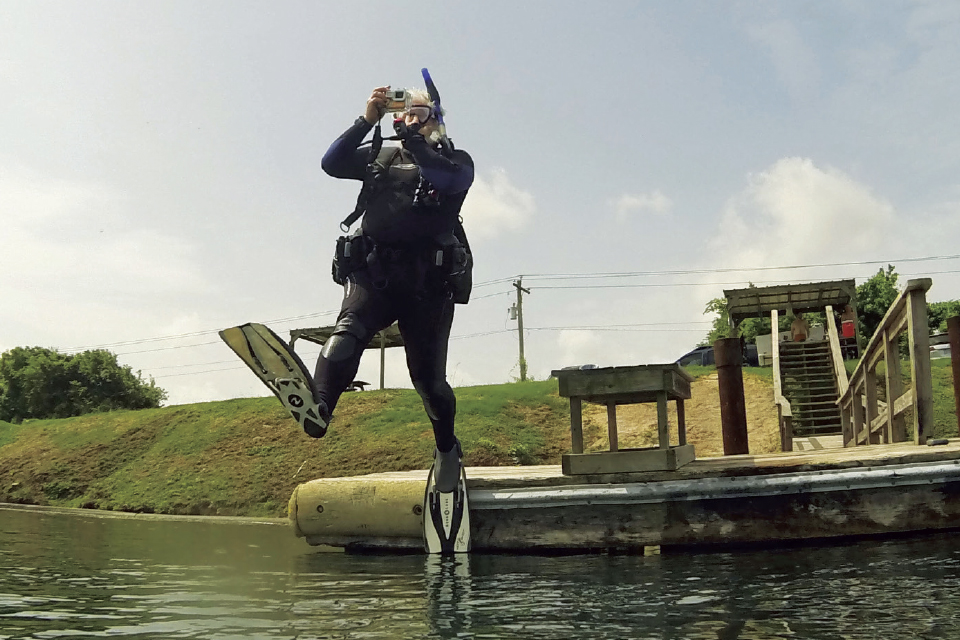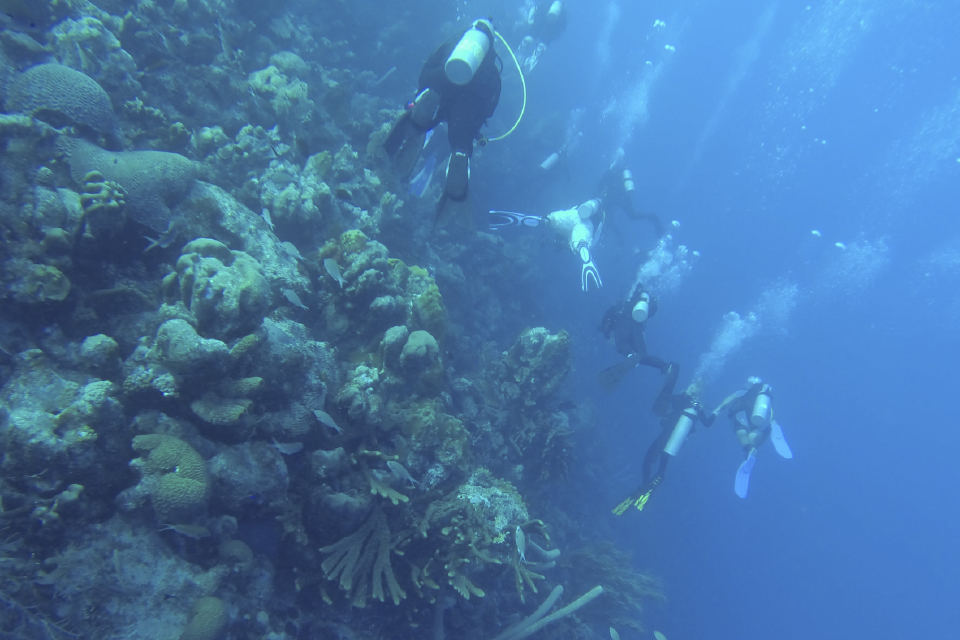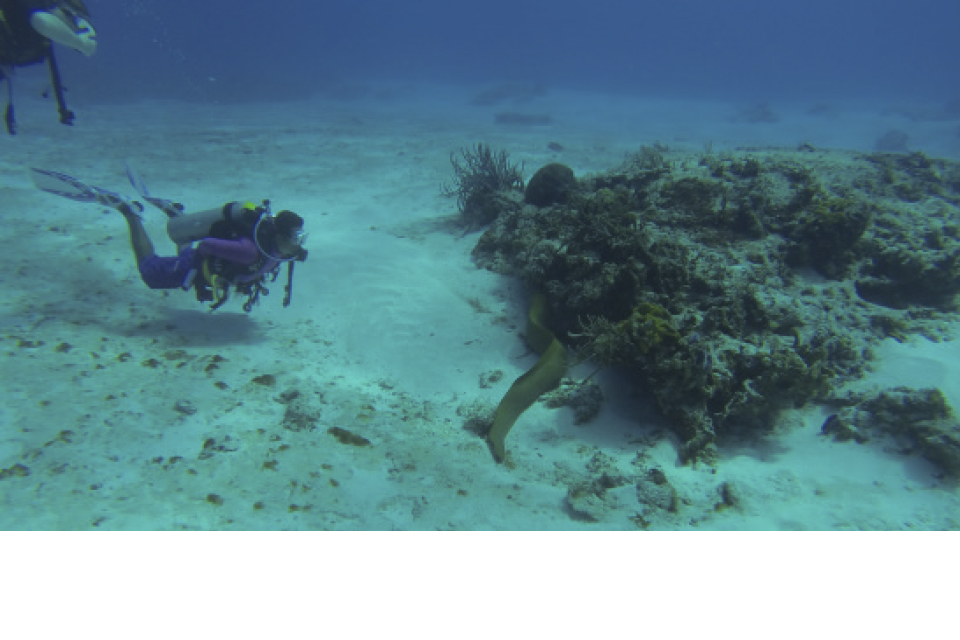Keep Calm and Dive On

“No doubt, the recent rains have been great for scuba diving in Central Texas,” confirmed Kirk Stolzenburg, Manager of Tom's Dive and Swim. “People love full lakes. It gets them excited to be out there and in the water once again!”
It goes without saying that Austinites are thrilled to, once again, have full lakes and a green city. There were those, like me, who were obsessed with visiting the website, isthelakefullyet.com, and anxiously awaited the moment that the “Nope” switched to “Yep.” Social media cheers and updates rang out like a Fourth of July fireworks party, and you could almost hear the boat engines firing up the moment this occurred.
Now that lake lovers can once again visit their favorite hotspots like Windy Point, Mansfield Dam, and Hippie Hollow, scuba divers, too, are excitedly seeking their escape below the surface of the now full waters. (albeit with more clothes than our friends at Hippie Hollow!)
It's Not a Competitive Sport—It's a Lifestyle
For those who have never gone scuba diving, the prevailing fear revolves mostly around breath control and proper use of the equipment. SCUBA, after all, does stand for “Self Contained Underwater Breathing Apparatus.” Just those big words strung together alone can bring out the panic in most newbies. (The second biggest fear is sharks, but if you're diving Central Texas lakes, you can leave those fears at home).
“If we can alleviate the breathing anxiety, we'll have someone hooked on the lifestyle in no time,” Stolzenburg said. “We have qualified instructors who love to help people of all ages and love to blow bubbles underwater, and the good thing is, this lifestyle isn't limited by age or gender.”
They certify divers as young as ten years old, and the demographics are very even between male and female divers these days.” Fortunately, most diving companies (Aqualung, for instance) have caught on and now design equipment and gear specifically for women and younger divers making that barrier to entry much less intimidating and uncomfortable.
Stolzenburg describes scuba like a yoga practice. “It's zen-like,” he said. “In the same way that you slow your breathing in yoga, you do the same with scuba diving.” People who dive on a regular basis love the lifestyle that comes along with it, and, John McAlpin, who is head of the Austin Aquanauts Dive Club, leads this lifestyle for the 200 plus members in his club here in Austin.
While they may hesitate to call it a competitive sport, both McAlpin and Stolzenburg do tout the fitness benefits of scuba diving, especially the fact that you burn 25 percent more calories in water than you do on land. They also recommend getting as fit as possible before learning how to dive. The gear is not light and usually weighs in around 30 to 50 pounds. While you don't feel that in the water, it is a load you must be comfortable with in training and on shore. Plus, the lighter you are, the less air you will go through on your dives.

Among the many other benefits of a diving lifestyle they profess:
+ It's a social event! You dive on a buddy system, so you're never alone.
+ People who dive are typically passionate about nature, the outdoors, and seeing the world from a completely different perspective.
+ Divers love to travel and share their experiences with others.
+ Diving is one of the best ways to unplug from the noise of real life. No one can find you when you're 60 feet below the surface of the water watching a turtle eat its lunch.
+ It's a great family activity. Not only is it fun and relaxing, but it's also educational.
+ Even if you're visiting the same spot, there's always something new to see.
+ Most dive shops are incredibly supportive and help you along the way.
+ The Aquanauts event host regular “Bubble Hours” with trips to local hotspots during the week.
Most importantly, divers are generous, philanthropic, and supportive. The organization Eels on Wheels is an adaptive scuba program created in Austin to provide people the opportunity to dive at their own ability level by certifying divers through the Handicapped Scuba Association (HSA). This nonprofit helps meet the needs of virtually anyone wishing to be a scuba diver regardless of any mental or physical limitation.
Keep reading to learn about how and where you can start scuba diving!
Where to Begin?
So, what's not to love about a lifestyle sport that involves travel, nature, and meeting new people? If that “fear of the unknown” still makes you a little weary, Tom's Dive and Swim invites you to try one of their complimentary “Intro to Scuba” classes! You'll schedule a time to experience underwater breathing with one of their certified instructors and will have a chance to ask questions, learn more about the process, and take those first steps to a new hobby.
From there, you are likely to register for an “Intro to Scuba” course taught by one of their instructors through the very prestigious SSI (Scuba Schools International). These in-depth classes prepare you both in their training pool, classroom, and finally in the open water in Lake Travis.
They also offer a wide range of refresher courses, safety, water rescue, and advanced diving courses as well.
Next thing you know, you'll be heading off on regular adventures with the Aquanauts to some of Texas' best diving locations!
Texas Diving Hot Spots and Upcoming Aquanauts Trips
Lake Travis—Windy Point: (windypointpark.com) Divers will find boat wrecks and metal sculptures of a scuba diver, a sea turtle, a shark, a manatee, and other interesting underwater objects. This is also a popular spot for your certification.
Athens Scuba Park: (athensscubapark.com) Divers will explore a 60' Hawker 600 Jet, three 30' sail boats, three cabin cruisers, a Lockheed C-140 Jet Star, a triple-deck party barge, and a DART bus.
Flower Gardens: (flowergarden.noaa.gov/visiting/divecharters.html) Located in Freeport, Texas, near Galveston, the Flower Gardens are the northern-most coral reef in the world.
South Padre Island: (sopadre.com) Explore the Texas Clipper, a 473' long World War II troop transport which is 17 miles offshore 132 feet below the surface or Seana's Rig rich in coral, barnacles, and tiny sea life.
Valhalla: (familyscuba.com) Dive deep in the heart of an old nuclear missile silo!
Mammoth Lake Water Park: (mammothlakewaterpark.com) Explore a military C-130 cargo plane, firetrucks, and the remnants of Houston’s famous theme park AstroWorld.
For More Information
Tom's Dive and Swim: tomsscuba.com for details on classes and the “Intro to Scuba” hour
Eels on Wheels Adaptive Scuba Program: eels.org
Austin Aquanauts Dive Club: facebook.com/AustinAquanauts
Two Other Dive Shops in Austin
Scuba Land Adventures: scubaland.com
Dive World: diveshopaustin.com







